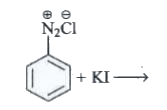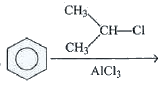2-Propanone (acetone) can be obtained by Wacker's process starting with:
Propyne
Propan-2-ol
Propene
Propanol-1-ol
The correct Answer is:C
To determine which compound can be converted to 2-Propanone (acetone) via Wacker's process, we need to analyze the options provided and understand the process itself.
1. Understanding Wacker's Process:
- Wacker's process is an oxidation reaction where alkenes are converted to carbonyl compounds (aldehydes or ketones) in the presence of palladium catalysts and other reagents.
- The general reaction involves the oxidation of an alkene to produce a ketone or aldehyde.
2. Identifying the Starting Material:
- We need to identify which of the given options can be oxidized to form 2-Propanone (acetone).
- The structure of 2-Propanone is CH3COCH3, which indicates that it is a ketone.
3. Analyzing the Options:
- Option A: Propane-2-ol (isopropanol) - This is an alcohol, and while it can be oxidized to a ketone, it is not a suitable starting material for Wacker's process.
- Option B: Propene - This is an alkene and can be oxidized to form 2-Propanone.
- Option C: Propanol-1-ol - This is also an alcohol and not suitable for Wacker's process.
- Option D: Propene - This is the same as option B and is a valid starting material.
- Option E: An alkyne (not specified) - Alkynes cannot be directly converted to ketones via Wacker's process.
4. Conclusion:
- The only suitable starting material that can be oxidized to form 2-Propanone via Wacker's process is Propene (C3H6).
- Therefore, the correct answer is Option B (Propene).
Final Answer:
2-Propanone (acetone) can be obtained by Wacker's process starting with Propene.
---
- Wacker's process is an oxidation reaction where alkenes are converted to carbonyl compounds (aldehydes or ketones) in the presence of palladium catalysts and other reagents.
- The general reaction involves the oxidation of an alkene to produce a ketone or aldehyde.
- We need to identify which of the given options can be oxidized to form 2-Propanone (acetone).
- The structure of 2-Propanone is CH3COCH3, which indicates that it is a ketone.
- Option A: Propane-2-ol (isopropanol) - This is an alcohol, and while it can be oxidized to a ketone, it is not a suitable starting material for Wacker's process.
- Option B: Propene - This is an alkene and can be oxidized to form 2-Propanone.
- Option C: Propanol-1-ol - This is also an alcohol and not suitable for Wacker's process.
- Option D: Propene - This is the same as option B and is a valid starting material.
- Option E: An alkyne (not specified) - Alkynes cannot be directly converted to ketones via Wacker's process.
- The only suitable starting material that can be oxidized to form 2-Propanone via Wacker's process is Propene (C3H6).
- Therefore, the correct answer is Option B (Propene).
2-Propanone (acetone) can be obtained by Wacker's process starting with Propene.
Topper's Solved these Questions
- BOOK - CENGAGE CHEMISTRY ENGLISHCHAPTER - ALIPHATIC AND AROMATIC ALDEHYDES AND KETONESEXERCISE - Exercises Assertion-Reasoning6videos
ALIPHATIC AND AROMATIC ALDEHYDES AND KETONES
- BOOK - CENGAGE CHEMISTRY ENGLISHCHAPTER - ALIPHATIC AND AROMATIC ALDEHYDES AND KETONESEXERCISE - Archives Objective10videos
ALIPHATIC AND AROMATIC ALDEHYDES AND KETONES
- BOOK - CENGAGE CHEMISTRY ENGLISHCHAPTER - ALIPHATIC AND AROMATIC ALDEHYDES AND KETONESEXERCISE - Exercises Multiple Correct33videos
ALIPHATIC AND AROMATIC ALDEHYDES AND KETONES
- BOOK - CENGAGE CHEMISTRY ENGLISHCHAPTER - ALCOHOL,PHENOL AND ETHERSEXERCISE - Archives Analytical And Descriptive15videos
ALCOHOL,PHENOL AND ETHERS
- BOOK - CENGAGE CHEMISTRY ENGLISHCHAPTER - APPENDIX INORGANIC VOLUME 2EXERCISE - Short Answer Type179videos
APPENDIX INORGANIC VOLUME 2
Similar Questions
Knowledge Check
- Question 1 - Select One
Benzene can be obtained by :
AC6H5OH+NaOHCuO−−→ΔBC6H5OH+ZnΔCC6H5−N=N−Cl+H2O→DAll of these - Question 2 - Select One or More
Iodobenzene can be obtained by :
A B
B C
C D
D
- Question 3 - Select One or More
Isopropyl benzenc can be obtained by :
A B
B C
C D
D
Ethylamine can be obtaine by
View SolutionBenzophenone can be obtained by ……
View SolutionIodine can be obtained from
View SolutionWater potential can be obtained by
View SolutionGiven below are some standard heats of reaction:
a. Heat of formation of water =−68.3kcal
b. Heat of combustion of acetylene =−301.6kcal
c. Heat of combistion of ethylene =−337.2kcal
Calculate the heat of reaction for the hydrogenation of acetylene at constant volume at 25∘C.View Solution

